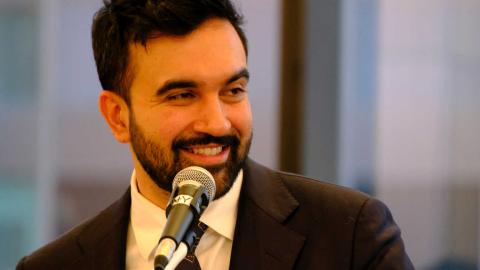
As the Anniversary of October 7th Approaches, Time to Rethink the Narrative of Netanyahu's 'Unpopularity'
JERUSALEM, Israel – As Israelis commemorate the Fall Feasts and mark the first anniversary of the somber, world-changing Hamas massacre and kidnappings on October 7th, 2023, the prevailing media narrative in Israel and around the world has suggested that it was only a matter of time before Prime Minister Benjamin Netanyahu’s government would topple under the weight of the events. It isn’t true.
In a column this week, JNS commentator Caroline Glick took a Fox News anchor to task for referring to Netanyahu's "unpopularity."
Glick asked, "How is it that she is unaware that Netanyahu is the most popular prime minister Israel has had in ages?"
Glick cited a Direct Polls tracking survey from two days after the Israel Defense Forces eliminated Hezbollah leader Sheikh Hassan Nasrallah, showing that for the first time since October 7th, the coalition government would gain a Knesset majority if the election were held today.
"As for Netanyahu, his popularity has reached epic proportions in Israel’s polarized political jungle, enjoying higher ratings than his top two rivals combined. In head-to-head matchups, he leads (Benny) Gantz in favorability 52% to 25% and (Yair) Lapid 54% to 24%," Glick noted.
The poll numbers were certainly dismal for the Netanyahu coalition in the weeks and even months after the shock of the attack, as Israelis struggled to comprehend how the territory around the Gaza Strip could be left so defenseless against a low-tech terrorist assault.
In a country with a population under 10 million, everyone knew someone with a loved one who was killed or kidnapped, or whose son, daughter, spouse, or sibling had been called up to fight in the Gaza streets and tunnels.
Taking a cue from the Biden administration and Senate Majority Leader Chuck Schumer, the Knesset opposition openly called for Netanyahu to be replaced while the war in Gaza raged.
Gargantuan crowds assembled weekly – sometimes daily – in Tel Aviv and Jerusalem, demanding a deal with Hamas for the hostages and the end of the Netanyahu government, lending credibility to the narrative that the crowds represented the majority of Israelis. They never did – even if majorities at one point or another wanted Israel to make great sacrifices to free the hostages.
The futility of the White House's push to focus on a Palestinian state and what comes "the day after" the war in Gaza was magnified by events such as the brutal Hamas execution of six hostages, including American-Israeli Hersh Goldberg-Polin.
The U.S. administration's opposition to destroying the remaining Hamas brigades in Rafah also was exposed as the IDF uncovered evidence of large tunnels from Egypt for smuggling weapons and vehicles, drugs, and humans.
Since October 7th, Israel's populace has supported the Netanyahu government's original goals of defeating Hamas, returning the hostages, and permanently preventing terrorists from using Gaza as a staging ground to attack Israeli citizens.
Recently, the Security Cabinet defined another goal: to restore the 60,000 residents of northern Israel who were forced to evacuate after October 7th to their homes. That goal also has widespread public support.
Netanyahu's decisive turnaround in the polls came following his July 24th speech to Congress as anti-Israel demonstrators in the streets tore down the U.S. flag at Washington's Union Station, raising the Palestinian flag.
Glick observed that "Any time Netanyahu walks down the street or his convoy drives past pedestrians, they shout out their support and clamor to take selfies with him. And as Israeli sociologist Dr. Avishai Ben Haim has noted, Netanyahu is the only prime minister since Menachem Begin whose supporters actively pray for him personally."
What the media and much of the world have failed to comprehend is that the staggering shock of October 7th buried, for most Israelis, the last vestiges of the "land for peace" mindset that Israel could concede control of territory in exchange for an end to hostilities with its adversarial neighbors – not given the current leadership on almost every border.
As Iran's Houthi missiles reach Tel Aviv, and Iran barrages Israel with sophisticated weapons, and Hezbollah rains down rockets on northern Israel past the Sea of Galilee, Israelis need little convincing that the battlefield must expand.
Netanyahu's repeated emphasis on victory isn't just a rallying cry to score political points. It conveys the "us or them" mentality that jarred the scales off of Israeli Jewish eyes following the slaughter, abduction, and rape of their fellow citizens.
Today, when the prime minister says, "We will win, with God's help," it sounds more like a prophecy than a campaign speech.
***Please sign up for CBN Newsletters and download the CBN News app to ensure you keep receiving the latest news.***




